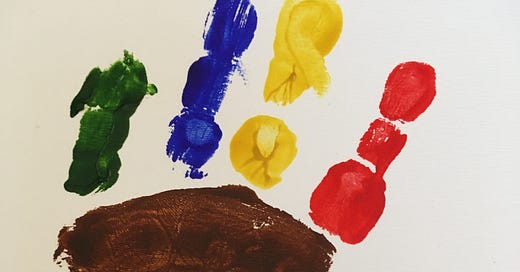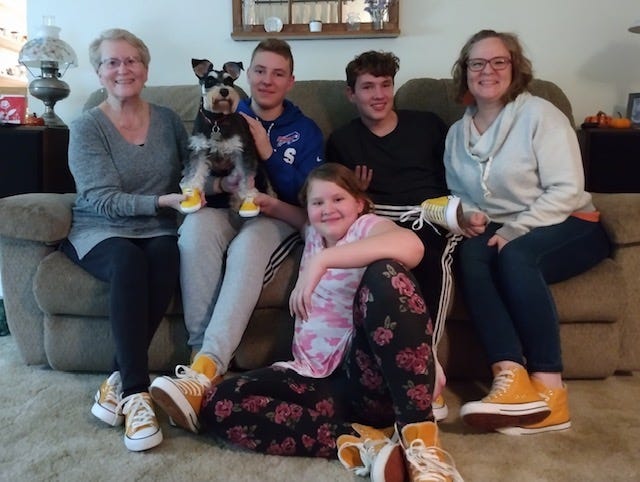Like many Americans, Thanksgiving is my favorite holiday. The focus is usually on gathering and sharing with loved ones, and it doesn’t require extensive decorating or buying gifts. The only thing over the top is the feasting. Some of my favorite family memories are gathering with all my aunts and uncles and cousins, usually at my Aunt Lucy and Uncle Wayne’s house where we would spend the day. You’d have one plate full from the food table (turkey, ham, fried chicken, stuffing, dressing, gravy, green beans, macaroni and cheese, cranberries, broccoli casserole, sweet potatoes, and more). And then you’d have at least one plate full from the dessert table—we always needed a separate table for all the desserts (pumpkin pie, pecan pie, apple pie, chocolate cake, cherry cheesecake, apple cider pound cake, cupcakes, and more). Then we might go outside and throw a football, or play Scrabble, or watch football—though for some of my uncles, “watch football” was really “take a nap.” My aunts would squabble over who was going to do the dishes. “No, you are not going to clean up! You’ve already done too much today!” “No, you go sit down and rest! You’ve been on your feet! I’ll wash the dishes!” No one won that argument—they would all be in the kitchen cleaning up, which I think they secretly all loved doing together.
When we moved into our current house, we knew that we wanted to host big Thanksgiving dinners for friends, and since I was off work I would spend Thanksgiving itself cooking and baking and prepping. On Saturday the house would fill with people and we would eat and drink and talk and laugh. It was exhausting and marvelous and provided some of my favorite memories here. After everyone left, David and I would squabble over who was going to do the dishes, although it usually went like this: “Why don’t you let me take care of the dishes?” “OK! That sounds great!” Unlike my aunts, I was happy to go put my feet up while someone else scrubbed and washed and rinsed.
Then Covid arrived, and we couldn’t host a gathering. I sadly looked at the list of friends I’d planned to invite and decided that instead of spending several days cooking I would send notes and cards of thanksgiving instead. It was a less-delicious expression of gratitude, but at least it was an activity, a practice, a discipline of celebration.
This year, Thanksgiving was a hybrid of disappointment and joy, of activity and meditation. David was able to spend Thanksgiving with his family, a joy we didn’t know would be possible even a few short months ago. Evan cooked his first turkey for his feast with friends in London, a bacon-wrapped marvel that I’m hoping he might try to replicate when he’s home so I can try it. Andrew and I were able to FaceTime with our American family members and then eat here with Jen. After Dave was safely home on Saturday, we gathered with some friends here for a lovely feast and even lovelier time of just being gathered around a table with people you care about.
The note of disappointment was that I’m unable to do much cooking since I fatigue so quickly when I stand. I don’t love cooking, so this is not usually a great feeling of loss in my daily life. But at Thanksgiving, I would love to be able to stand for hours and roll out pie crusts and prep casseroles and chop vegetables. I would love to be able to make three kinds of pecan pies and my mother’s cornbread dressing and my Aunt Betsy’s macaroni and cheese and my Aunt Lucy’s sweet potato casserole and all the other family recipes I’ve accumulated for this feast. This year, Jen was here to help make any required dishes, and when she suggested that I go sit and let her take care of it, I knew she was right.
Instead of cooking as my activity of thanksgiving, I decided to write cards and notes again. This year it seemed appropriate to focus on my health-care team—the doctors and nurses and physiotherapists and medical secretaries and tea trolley volunteers and the angel who does the covid checks at the hospital—all those who are helping me navigate life with incurable cancer with their expertise and competence and care and smiles. Do I wish that I didn’t have to think about oncology and neurological rehab and covid checks? Of course I do. Do I wish that I could give thanks by cooking for three days rather than by writing cards to my medical team? Yes. But at the same time, I am grateful that I am still able to practice giving thanks—and whether that is expressed through cooking or writing or squabbling over who will wash the dishes, there is joy in that discipline of celebration.

We’re now in the season of Advent. This past Sunday, many of us lit the first candle and read or heard a meditation on hope, which the first Advent candle represents. I find that this year the notion of hope hits a little differently than before. In fact, I feel irritated and annoyed by hope. What is hope when you have incurable cancer?
The poets and philosophers and theologians and even the sages of Instagram all have said plenty about hope. For me, it’s easier to say what I think hope is not. It is not a wish for all to be well. It is not an optimistic outlook. It is not staying positive. It is not a belief that things will be better in the future. In fact, it is not a feeling or idea or notion at all. I think hope is an action—it is holding on, right now, in the present. Hope sees the reality of the storm and the darkness, and gets out of bed anyway. Hope acknowledges that incurable cancer is terrible, but embraces the gift of life for today. Hope is a discipline of holding on to truth: Jesus came, Jesus will come again, and in the meantime we are able to hold on because God is holding on to us.
The first candle of Advent reminds us to look back at what God has done and look forward to what he has promised to do. But we shouldn’t leave out the in-between, the now, that is the location where we practice the discipline of hope.
“Hope” is the thing with feathers - (314)
“Hope” is the thing with feathers -
That perches in the soul -
And sings the tune without the words -
And never stops - at all -
And sweetest - in the Gale - is heard -
And sore must be the storm -
That could abash the little Bird
That kept so many warm -
I’ve heard it in the chillest land -
And on the strangest Sea -
Yet - never - in Extremity,
It asked a crumb - of me.
And if we might grant that Emily Dickinson was on to something true about hope, the thing with feathers, then perhaps we might also appreciate the injunction by They Might Be Giants to “make a little birdhouse in your soul.”
In a nod to British culture, I’ve chosen the video of them performing on Top of the Pops, a slice of cheesy goodness that feels like an appropriate side dish for this feast of thanksgiving and hope.






Heather, I found your blog from Jen's email letter. Both of my parents were diagnosed with cancer in 2020. My mom with stage 4 ovarian cancer and my dad with stage 2 bladder cancer. I live about 17 hours away and to say it has been difficult is an understatement. I know you know. Your words regarding Hope hit my heart like a breath of fresh air. I needed them. Thank you for being so transparent. Praying you feel the amazing presence of Immanuel as you take one day at a time to be present in hope. Immanuel -God with us. What a gift. Merry Christmas.
Thanks for your words, Heather. I found your comments on hope so thought-provoking and human that I read them aloud to our staff. We all agreed, reflected, and prayed. Big hi to David too.